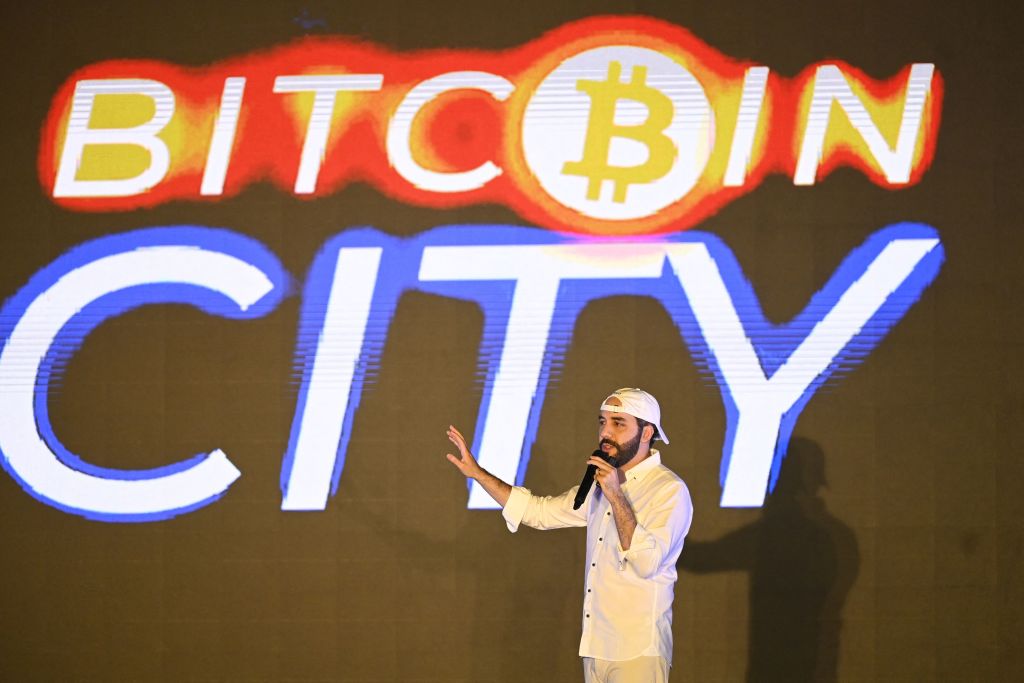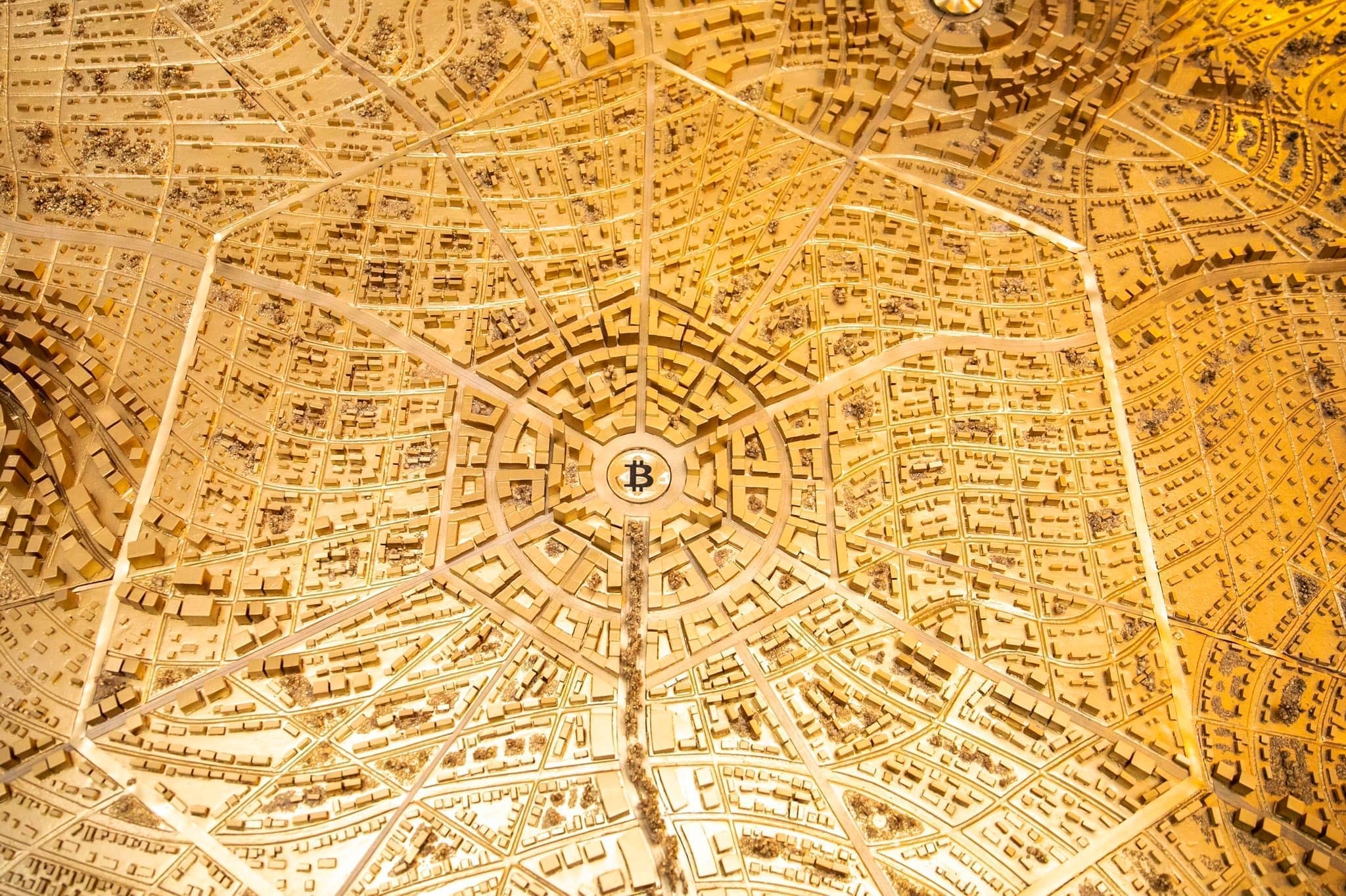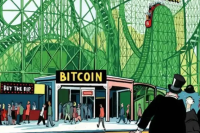A golden city on the coast of the tropical Pacific. A metal walkway suspended above a verdant volcano. And a glossy marina that looks like it belongs in Monte Carlo rather than a near failed-state besieged by some of the world’s most violent criminals.
The detailed gilded model released this week of ‘Bitcoin city’ – the first ever dedicated cryptocurrency trading hub, to be built on El Salvador’s western shore and powered by geothermal energy from a volcano – is nothing if not spectacular.

The grandiose project is the brainchild of the troubled Central American nation’s headline-grabbing populist president, Nayib Bukele, arguably now the world’s foremost cryptocurrency evangelist after foisting Bitcoin as legal tender on his largely bewildered compatriots last year. In September, every El Salvadoran citizen was given $30 worth of Bitcoin in a government issued crypto wallet – although many reported that the money mysteriously disappeared from their accounts.
Meanwhile Bukele, a 40-year-old former businessman and marketing executive with a serious Twitter habit and a penchant for wearing baseball caps backwards, has risked the ire of the International Monetary Fund, who say he is taking gratuitously ‘large risks’ with El Salvador’s precarious economy.
With the world’s highest murder rate, ravaged by mara street gangs, cartels funnelling cocaine from the Andes up to the United States, and an annual per capita GDP of just £3,000, you might think that Bukele had more pressing — and realistic — priorities than turning the region of La Union, an impoverished rural backwater on the Pacific Coast where Bitcoin city will be built, into the epicentre of the highly volatile crypto-revolution.

Yet if one thing has become clear about Latin America’s first millennial head-of-government or, as he once styled himself, ‘world’s coolest dictator’ (he seems to have only been half joking) Bukele is a master at both upping the rhetorical ante and the bait-and-switch, swiftly making new promises before El Salvadorans can realise that he has failed to keep his previous ones.
That has made him Latin America’s most popular leader, with approval ratings frequently above 80 per cent. It’s not clear though how long can he pull off this balancing act. Will he be able to actually deliver Bitcoin city, which is meant to have a zero-carbon footprint and drive economic development, as he has promised?
Bitcoin city is to be financed with a ‘Bitcoin bond,’ worth more than $1 billion. Half that money will go to the development of the city and the other half will grow the El Salvadoran treasury’s Bitcoin reserves.
Currently, El Salvador has 2,301 Bitcoins, including 500 bought this week, at a cost of around £30 million, just after Bitcoin halved in value in a matter of days. El Salvador was buying Bitcoin on ‘the dip’, Bukele boasted. As of Tuesday, the value of the country’s coins had fallen by 28 per cent.
Thanks to the latest wild fluctuations in cryptocurrencies’ value, investors are starting to question whether the likes of Bitcoin, Ethereum and Tether really are a safe haven from choppy economic waters – as Bukele and other crypto bros have claimed. That potentially bodes ill for Bukele’s high stakes crypto bet – and Bitcoin city in particular. The Bitcoin Bond was initially planned to launch in March but has been put on indefinite hold for what can elegantly be summed up as the right market conditions.
If it is not released soon some are sounding the alarm that El Salvador could default on a $800 million loan payment due in January. If this happens, in all likelihood it will be ordinary El Salvadorans footing the bill.
Yet Bukele, who likes to sell himself as a tech-savvy, non-ideological problem solver, is unlikely to be deterred. For him, the Bitcoin experiment and his other market reforms are necessary to drive El Salvador into the industrialised world. ‘The plan is simple: as the world falls into tyranny, we’ll create a haven for freedom,’ he tweeted earlier this year in the style of a Silicon Valley crypto bro.
Of course, his definition of freedom is decidedly heterodox. Since taking office in 2019, Bukele has persecuted critical journalists, sent armed soldiers into the national assembly, fired a corruption prosecutor investigating his administration, and introduced anti-Covid 19 measures almost as draconian as those in China. Human Rights Watch accuses him of waging an ‘assault on democratic institutions.’
Meanwhile, the money-laundering potential of cryptocurrencies, which were specifically designed to provide users with anonymity, in a major international cocaine hub has barely been explored by local and international media covering El Salvador’s Bitcoin experiment.
Despite this, crypto activists and entrepreneurs have rushed to hitch their wagons to this deeply problematic project and its erratic, fast-talking founder. One, Samson Mow, chief strategy officer of blockchain-technology provider Blockstream, has even claimed that El Salvador — a society which has seen more than one million people, roughly one sixth its population, flee to the US to escape the bloodshed and squalor – ‘will become the financial centre of the world.’
How much of your savings would you bet on that becoming the case? But while it’s easy to mock Bukele’s Bitcoin schemes, spare a thought for the millions of El Salvadorans who, thanks to their attention-seeking president, are now trapped in his cryptocurrency world.







Comments